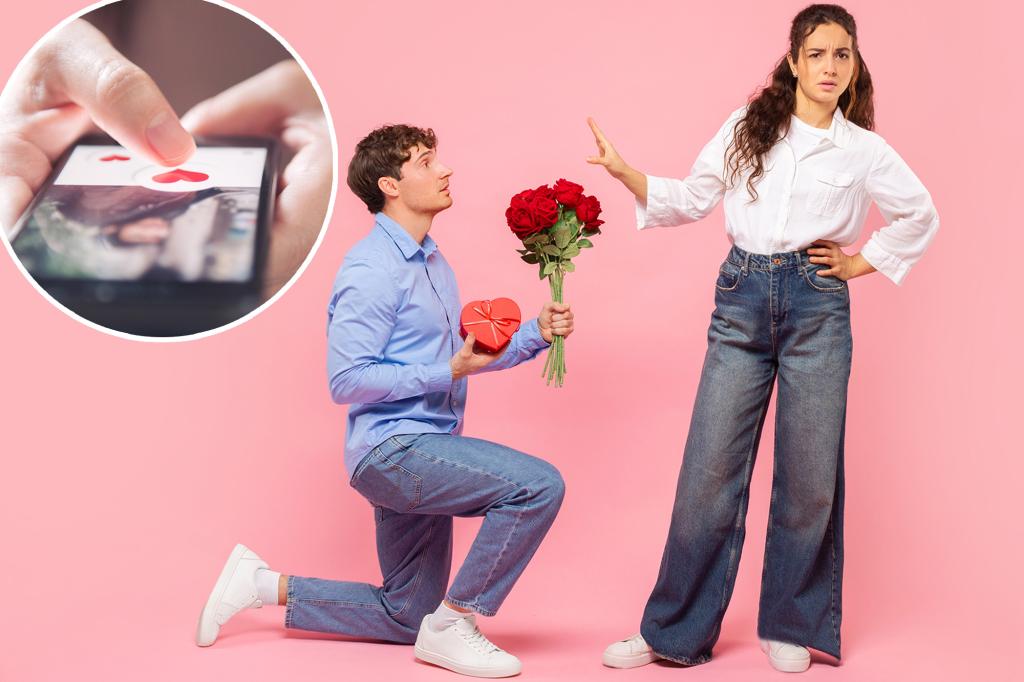Burned out by ghosting, mixed signals and endless “situationships,” young singles are calling it quits on dating — no longer holding out for a fairytale ending that never texts back.
“We’re single because we’re out here looking for ’90s love in this generation,” one fed-up TikToker declared. “We want slow jams, handwritten notes and phone calls on landlines . . . not ‘what are you doing’ texts followed by eight hours of silence.”
A new Rasmussen Reports poll of more than 1,200 American adults shows 37% of singles under 30 say they’re not interested in dating, with half of all singles saying they’re not even looking.
Even the apps can’t keep love alive: only 33% of singles have ever used one, and nearly a third of those say they’ve logged off for good.
Democrats were the most likely to be single and not looking, with 49% opting out, while Republicans were more likely to be married and off the apps entirely, with 59% reporting they were hitched, the poll found.
That trend shifts by age and gender: among singles under 40, men were more likely than women to say they’re not interested in dating, at 39% compared to 30% — a reversal of older age groups, where women were more likely to opt out.
The findings mirror a broader hesitation around dating itself, as more young adults question whether it’s worth the time, energy or emotional cost.
“Gen Z is pulling back from romantic relationships overall, not just marriage,” said Dr. Jean Twenge, author of “Generations: The Real Differences between Gen Z, Millennials, Gen X, Boomers and Silents — and What They Mean for America’s Future.” “They are more interested in safety than previous generations . . . and they may see dating as unsafe given its potential for hurt.”
In 2000, 80% of U.S. high school seniors had dated in the past year. By 2023, that number had dropped to 45%, according to nationally representative data cited by Twenge.
This generational pullback is now part of what researchers call a growing “loneliness epidemic.”
A 2024 study by market research company GlobalWebIndex found 80% of Gen Z respondents said they’d felt lonely in the past year, more than any other generation surveyed.
The “why” is complex: rising depression rates, a decline in in-person friendships and even easy access to pornography may all be playing a role, Twenge said.
But other experts say the shift isn’t about giving up on love, just reordering priorities.
“Finding a romantic partner isn’t a primary goal — instead, they’re prioritizing their mental well-being and dreams for their career,” said Amanda Gesselman, director of sex and relationship science at Match.com.
Many young people may crave intimacy, just not the kind that starts with endless scrolling or awkward conversations with strangers, said Deborah Tannen, a professor of linguistics at Georgetown University.
“They are not comfortable talking to people they don’t already know from some natural connection,” Tannen told The Post. “If their experience of dating is associated with apps, it’s easy to understand why many might decide to swear off: too alienating, too much disappointment, too intimidating to put oneself on the line that way.”
That discomfort shows up in daily habits, too.
Some Gen Zers even avoid calling restaurants and prefer to order online, a small example of how communication itself feels riskier to them, Tannen said.
On TikTok, the frustration plays out in real time.
One post with nearly 300,000 likes read, “Single because this generation is full of lust, liars and cheaters.”
Another viral video, which pulled in more than 800,000 likes, put it more personally: “Me trying to explain to my friends how I’m literally going to be single forever because dating in this generation is stupid and I’m tired of mfs playing with my time.”
Others kept it blunt.
“I’m staying single for the rest of my life,” one user wrote.
“Single because no guy will ever understand me,” another added.
Read the full article here

